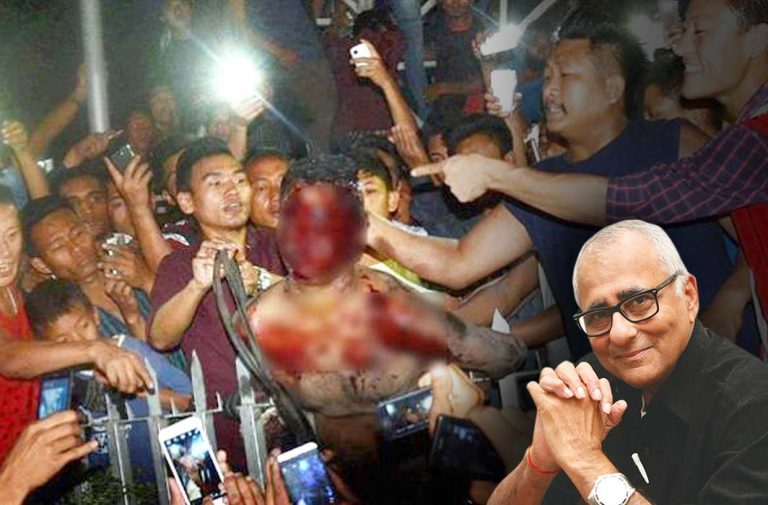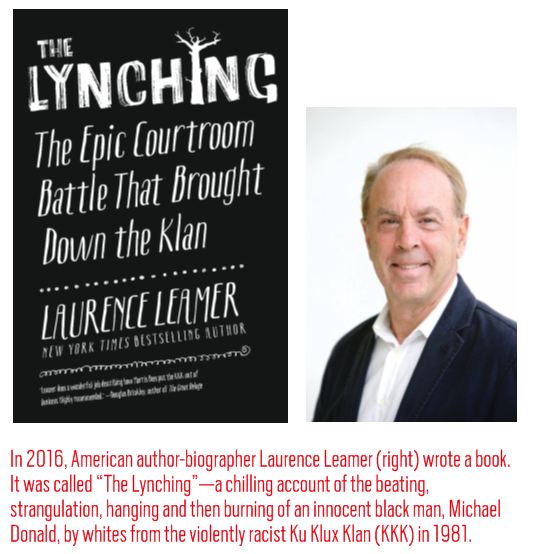
Above: The Dimapur lynching incident in March 2015. An alleged rapist was taken out of a local jail and killed in full public view
~By Inderjit Badhwar
Shiv Visvanathan’s cover story in our previous issue, “Incredibly Violent India”—the headline was a play on the “Incredible India” brand slogan designed to project the country as a preferred tourist destination—was a significant milestone in journalism in that it highlighted the primacy of the mobile phone and instant messaging as the first weapon in promoting the growing culture of barbarism and bestiality associated with mob lynchings across the country.
Tweet or whatsapp a rumour or a fake accusation with morphed or false pictures, and the barbaric, bloodthirsty ritual begins. The perpetrators—there were at least 28 lynchings at last count in 2018, most of them poor, minorities, and migrant workers—go mostly scot-free. Recently, the Supreme Court lectured states on the importance of preventing and prosecuting these crimes. But Visvanathan argues that when a mob becomes the self-styled instrument of justice, law and order can do little. The story fades away in a few weeks “till the spectre of fake news strikes again. Democracy has few answers to this trickster of technology claiming innocent lives by the dozen”.
Many of us watch with helpless horror the headlines that regularly tear into our senses and sensibilities: “Jamshedpur limps back to normalcy after lynching of 7 men over WhatsApp rumour.” “African lynched in Delhi after spat over auto ride…” Have our roads and streets and farmlands become sanctuaries of immunity for practitioners of hate and blood?
Is there a hope that impartiality and justice can prevail in such cases? Yes, but only if the state is respected as not being complicit. Vocabulary.com describes lynching as putting to death a person through mob action without recourse to the law—“an unlawful murder by an angry mob of people. Throughout history, dominant groups have used lynchings as a way of controlling minorities. When people take the law into their own hands and decide to punish a suspected criminal—or merely a person who’s seen as challenging the status quo—the result can unfortunately be a lynching. Lynchings have most often involved hanging, especially during the period of racially motivated lynchings in the American South”.
According to the National Association for the Advancement of Colored People (NAACP), the leading US civil rights group, 4,749 innocent Americans, 80 percent of them black, were lynched by white mobs or hate groups between 1882 and the mid 1960s.
 But the story has not been allowed to “fade away”. In 2016, the celebrated American author and biographer Laurence Leamer wrote a powerful book. It became his umpteenth best-seller. It was called “The Lynching”—a chilling account of the beating, strangulation, hanging and then burning of an innocent black man, Michael Donald, by whites belonging to the violently racist Ku Klux Klan (KKK) in 1981.
But the story has not been allowed to “fade away”. In 2016, the celebrated American author and biographer Laurence Leamer wrote a powerful book. It became his umpteenth best-seller. It was called “The Lynching”—a chilling account of the beating, strangulation, hanging and then burning of an innocent black man, Michael Donald, by whites belonging to the violently racist Ku Klux Klan (KKK) in 1981.
Leamer is a close friend. We were classmates at Columbia. He had shown me the manuscript while he was editing it, and I was doubtful of its success. Who, I asked him, would be interested in reading about something that happened over two decades ago? I was wrong. The book rattled America’s conscience, especially at a time when President Donald Trump was rising to power with the help of white supremacists.
The book’s relevance lies not only in its world-wide message, but also because it contains a powerful primer on how to prevent hate groups, backed by larger organizations which remain in the background, from retaining their organizational strength and authority. You have to cripple them financially. And that’s precisely what Morris Dees, the lawyer who prosecuted and convicted the murderers, was able to do. This legal battle and strategy are what make Leamer’s book stand out and should be a must read for lawyers and students in India who want hate crimes to be prosecuted and their instigators to be destroyed.
Christopher Lawson, reviewing Leamer’s book in Goodreads, says the book is really about how Dees used a novel legal approach in a civil trial to completely destroy the organization: “Dees hoped the amount would be so large that it would dramatically announce that the Klan could no longer commit violent acts against black people.” As a side benefit of the civil trial, further criminal charges were later filed.
Tweet or whatsapp a rumour or a fake accusation with morphed or false pictures, and the barbaric, bloodthirsty ritual begins. The perpetrators—there were at least 28 lynchings at last count in 2018, most of them poor, minorities, and migrant workers—go mostly scot-free.
The two men were convicted, but Dees wanted to go beyond just convicting these two—he wanted to topple the entire Klan organization that had encouraged the violence: “Dees was convinced that the KKK could be sued directly for its role in the murder.” In this case, the KKK was officially the “United Klans of America, UKA”.
The ensuing civil trial, which set a powerful legal precedent, is officially known as, Beulah Mae Donald, as Executor of the Estate of Michael Donald, Deceased v. United Klans of America. “The trial tested an important concept,” Lawson writes. “Can an organization be held accountable for criminal acts of its members? To succeed at court, Dees would have to cross several legal hurdles. For one thing, Dees would have to show a pattern of violence involving the United Klans of America. In other words, he had to show a PATTERN of violence instigated by prominent officials in the hierarchy.
“So that’s what Dees argued in the trial. He persuaded the jury that the Klan didn’t merely dislike black people–it was a lot more than that: ‘We have a piece of evidence, I think, that’s going to convince you that this national organization did more than just espouse a racial philosophy; they actually encouraged their members to kill and lynch black people.’
“Dees’ opponents in the trial argued persuasively that one couldn’t hold an organization responsible for just THINKING certain things. That’s not the way the system is supposed to work, they told the jury: ‘In this country we don’t punish organizations. We don’t punish thought. It would be bad if we did.’ With these two different theories of the law, it was not obvious how the trial would end.
“In an astonishing turn, one of the defendants—one of the original two murderers—appealed to the jury during final arguments. A repentant Knowles {one of the killers} pleaded for the jury to find against himself! And also make the Klan responsible: ‘Whatever judgment you decide, I do hope you decide a judgment against me and everyone else involved. Because you people need to understand this can’t happen. I do hope that you find a judgment against me and everyone involved. Because we are guilty.’”
Knowles also publicly apologized to the mother of the slain man: “If I could trade places with him, I would.” Amazingly, Mrs. Donald graciously accepted Knowles plea: “I forgive you. From the day I found out who you all was, I asked God to take care of y’all, and He has.”
On February 12, 1987 the jury awarded plaintiff’s damages of seven million dollars. “This financially wiped out the organization—the Klan had nowhere near that sum,” writes Lawson. “More than that, however, this trial set a precedent for legal strategy against other hate groups. This same strategy was used by SPLC lawyers to cripple and destroy a dozen racist organizations, from the White Aryan Resistance in 1990 to the Imperial Klans of America in 2008.”
Leamer’s book brought into focus a poem written by Claude McKay in 1922, called “The Lynching”. Slavery had been abolished by then in America but violence against minorities continued. What Leamer did as a journalist, McKay did as a poet almost 95 years earlier. Writes Soheila Battaglia: The poem paints a disturbing picture of a lynching and reveals much about the darkest elements of humanity:
His spirit is smoke ascended to high heaven.
His father, by the cruelest way of pain,
Had bidden him to his bosom once again;
The awful sin remained still unforgiven.
All night a bright and solitary star
(Perchance the one that ever guided him,
Yet gave him up at last to Fate’s wild whim)
Hung pitifully o’er the swinging char.
Day dawned, and soon the mixed crowds came
to view
The ghastly body swaying in the sun:
The women thronged to look, but never a one
Showed sorrow in her eyes of steely blue;
And little lads, lynchers that were to be,
Danced round the dreadful thing in fiendish glee.
After his own book was published, Leamer passed on to me a letter he received from a group of Indians who have formed a book club. I reproduce here the text of that letter signed by Richa Dubey:
“Dear Mr. Leamer—
“I wanted to write to you to thank you for writing this incredible book. We have a small book club and we just finished reading your book and had an engaging, thoughtful discussion yesterday. This book raises several complex set of issues that we explored as part of our discussion.
“It is a great learning. As the book says the current generation is really not aware of what segregation was like and how far we have come. Most of us are immigrants and while we have not seen segregation here, we have our own experiences with caste and religious discrimination. It was very interesting to compare what happens here in America with what we saw growing up in the form of caste discrimination. This should become required reading so that people are aware what a society is capable of doing and so that we don’t ever go back to that.
Many of us watch with horror the headlines that tear into our sensibilities: “Jamshedpur limps back to normalcy after lynching of 7 men over WhatsApp rumour.” “African lynched in Delhi after spat over auto ride…” Have our roads, streets and farmlands become sanctuaries of immunity for practitioners of hate and blood?
“It also left me in disbelief of what humans are capable of doing. I am left with a lot of questions as well—the African-Americans in this country have been treated so unfairly. How could this happen? What can be done to really change people’s attitudes. Most of us felt that while things will improve this cycle of racial hate will continue. It seems to be basic human nature. We drew parallels to what is happening today. The issues and caste of characters seem very similar which is scary.
“I found Mr Dees to be amazingly inspirational. So much respect. The web is full of accounts on him, some not so complimentary. But what he did in this case is his true legacy and his actions forever changed the course of history. Thank you for giving him due credit. I wish to meet him some day.
“In the end we were all left with lot of hope. While there is injustice in this world, there are good people who will fight evil. This from the Bhagwat Geeta is what Hindus live and believe and the happenings here make our belief even stronger:
‘Yada yada hi dharmasya glanirbhavati bharata
‘Abhythanamadharmasya tadatmanam srijamyaham
‘Paritranaya sadhunang vinashay cha dushkritam
‘Dharmasangsthapanarthay sambhabami yuge yuge
‘The meaning of these two shlokas is:
‘Whenever there is decay of righteousness, O Bharata,
‘And there is exaltation of unrighteousness, then I Myself come forth;
‘For the protection of the good, for the destruction of evil-doers, For the sake of firmly establishing righteousness, I am born from age to age’.”

